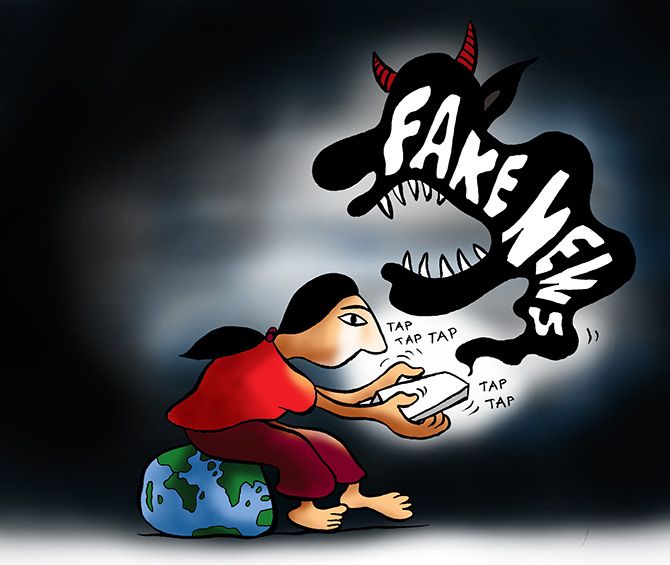The updated election ads policy for India will require advertisers to provide a 'pre-certificate' issued by the EC or anyone authorised by the poll panel, for each ad.
Further, Google will verify the identity of advertisers before their election ads run on its platforms, reports Peerzada Abrar.
Illustration: Uttam Ghosh/Rediff.com

As the country braces for the general elections this year, technology giant Google last week said it is bringing more openness to election advertising online and is enabling voters to get the election-related information they need.
To bring more transparency to the online election ads, Google is introducing an India-specific 'Political Advertising Transparency Report' and searchable 'Political Ads Library'.
Through these initiatives, which will go live in March this year, the company is looking at providing comprehensive information about who is purchasing election ads on Google platforms and how much money is being spent.
This year, over 850 million Indians are expected to cast their votes to elect the country’s next government.
"We're thinking hard about elections and how we continue to support democratic processes in India and around the world," said Chetan Krishnaswamy, director, public policy, Google India, adding, "We are bringing more transparency to election advertising online, and surfacing relevant information to help people better navigate the electoral process."
In light of recent controversy about fake news and foreign interference in elections specifically, the case of Russian involvement to influence United States elections, "The present initiative by Google, in terms of the India-specific Transparency Report, is commendable," said Salman Waris, managing partner at Delhi-based specialist technology law firm TechLegis Advocates & Solicitors.
"This is because such data would show how the policies and actions of political parties and corporations affect privacy, security, and access to information online. It will show to what extent they are trying ‘to influence digital and online media platforms," said Waris.
Experts say such initiatives need to be emulated on a large scale by other information technology service providers, especially in the social media domain.
They are increasingly seeing scandals surrounding Facebook-Cambridge Analytica, hacking of democratic processes, and fake news on platforms like WhatsApp.
The Facebook-Cambridge Analytica data scandal was a major political scandal in early 2018. It was revealed that British analytics firm Cambridge Analytica had harvested the personal data from Facebook profiles of millions of users without their consent and used it for political purposes.
Pavan Duggal, a top cyberlaw expert and a Supreme Court lawyer, sees Google’s initiative as a good start, but "a drop in the ocean". He said Google’s initiative is unlikely to have a substantial impact on the dissemination of fake news.
"Because India does not have fake news law," he said.
Duggal said there are other challenges as well such as knowing whether a particular advertisement is a political ad and also the source of funding behind it.
Facebook recently said it is providing some of its political advertising rules and tools to prevent election interference in India, the European Union, Ukraine, and Nigeria.
The most popular social network worldwide, which has 2.27 billion monthly active users, has become a platform for politicians and their rivals to spread propaganda and fake news.
According to data platform Statista, India claimed the first place with 294 million users, ahead of second-ranked US with 204 million users, as of October 2018.
The updated election ads policy for India will require advertisers that are running election ads in India to provide a 'pre-certificate' issued by the Election Commission of India or anyone authorised by the ECI, for each ad they wish to run.
Further, Google will verify the identity of advertisers before their election ads run on its platforms. The advertiser verification process will begin on February 14.
In the build-up to the elections, people need useful and relevant information to help them navigate the electoral process.
For the 2019 general election, Google will make electoral information from the ECI and other authoritative sources easily discoverable on Search.
"We have to see what kind of supervisory role the ECI would have on these political advertisements. Most of them have been out of their ambit all these years," said Duggal.










 © 2025
© 2025